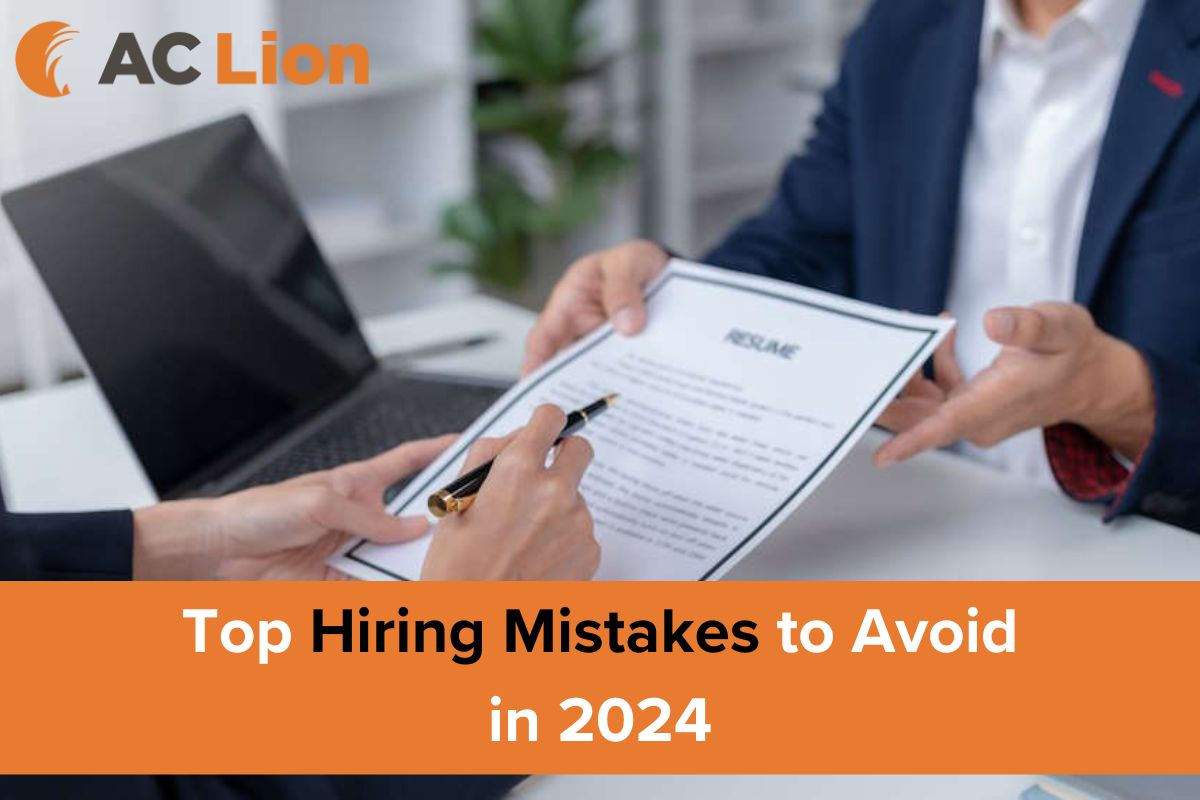Top Hiring Mistakes to Avoid in 2024


Over the past year, the recruitment landscape has undergone a profound transformation, catalyzed by a confluence of technological advancements and the enduring impact of the post-pandemic era. The rise of remote interviewing has become a cornerstone in the recruitment process, necessitating a re-evaluation of traditional assessment methods.
Additionally, AI-driven recruitment tools have emerged as invaluable assets in proactive hiring practices. Amidst these changes, candidate expectations have evolved, demanding a seamless and tech-savvy hiring experience. The ability to adapt to these new trends and challenges is paramount for businesses seeking to attract top talent.
Common Hiring Mistakes You Should Avoid
Steering clear of common hiring mistakes is imperative for fostering a robust workforce. Here, we delve into pitfalls and teach you how to avoid hiring mistakes..
1. Overlooking the Importance of Soft Skills
In today’s remote, asynchronous communication-driven job market, soft skills have emerged as indispensable assets, fostering successful professional interactions and collaborative endeavors. Key soft skills such as communication, teamwork, and adaptability play a pivotal role in shaping workplace dynamics. Effective communication is essential for remote teams to convey ideas clearly and build cohesive relationships, while teamwork cultivates a collaborative spirit that is vital for achieving collective goals.
Adaptability, especially in the face of rapidly changing work environments, enables employees to navigate uncertainties and embrace innovation. These soft skills contribute to a positive work environment by fostering open dialogue, strengthening team bonds, and creating a culture that values diverse perspectives.
2. Neglecting Diversity and Inclusion
The significance of diversity in the workplace extends beyond mere representation, as diverse teams have been proven to catalyze better problem-solving and foster creativity. A diverse workforce brings together individuals with varied experiences, backgrounds, and perspectives, enabling a richer pool of ideas that can be crucial in tackling complex challenges and driving innovation.
Moreover, diverse teams inherently reflect a broader range of customer perspectives, enhancing an organization’s ability to understand and meet the needs of an increasingly diverse market.
To cultivate inclusivity, strategic hiring practices are imperative. This includes removing bias from job descriptions to attract a more diverse candidate pool, implementing blind recruitment processes that conceal irrelevant personal information, and ensuring diverse interview panels to minimize unconscious biases.
3. Relying Solely on Traditional Recruitment Methods
Traditional hiring processes, relying on in-person interviews and standard resume screenings, inherently possess limitations that may exclude diverse talents. These methods can perpetuate biases and overlook candidates with non-traditional career paths. Embracing innovation in recruitment is crucial.
AI-driven applicant tracking systems enhance efficiency and mitigate bias, virtual reality assessments provide immersive insights into candidates’ skills, and social media recruiting widens the talent pool. These digital tools not only address the shortcomings of traditional approaches but also facilitate a more inclusive and dynamic hiring process, ensuring organizations access a diverse array of qualified candidates.
4. Ignoring Employer Branding
Employer branding is pivotal in attracting top talent by differentiating a company in the competitive job market. A robust brand communicates a compelling narrative about the workplace, fostering trust and connection with potential hires. To enhance employer branding, organizations can leverage social media to showcase vibrant company culture, feature employee testimonials that highlight positive experiences, and communicate transparently about values and mission.
Consistent, authentic messaging across platforms establishes a strong employer brand, making the organization more appealing to skilled professionals seeking alignment with their values and a positive work environment.
5. Failing to Provide a Positive Candidate Experience
Candidate experience profoundly influences hiring success, as a negative encounter can dissuade talent and tarnish a company’s reputation. A positive candidate journey, conversely, enhances the employer brand and attracts top candidates. Timely communication, respectful interview processes, and offering constructive feedback contribute to a favorable experience.
Ensuring transparency, demonstrating appreciation for candidates’ time, and maintaining professionalism throughout the hiring process fosters a positive impression, even for those not ultimately selected. Prioritizing candidate experience not only secures top talent but also establishes a positive relationship. It influences future talent acquisition efforts and sustains a favorable employer reputation.
6. Overemphasis on Experience Over Potential
The debate between experience and potential in hiring is nuanced. Overemphasizing experience may overlook ambitious, adaptable, and innovative talent. Identifying and nurturing potential involves evaluating qualities like learning agility, resilience, and a growth mindset. These attributes indicate a candidate’s capacity to evolve and contribute to an ever-changing workplace.
Balancing experience with potential allows organizations to harness the dynamism of individuals who bring fresh perspectives and a drive to learn and grow. Implementing a recruitment process that recognizes and values potential ensures a workforce that not only meets current demands but also thrives in the face of future challenges.
7. Inadequate Onboarding Processes
A robust onboarding program is pivotal for employee retention and engagement, setting the tone for a successful tenure. This goes for both in-person and remote employees; inadequate onboarding is one of the biggest mistakes when hiring remote workers. Structured training programs provide essential skills, while mentorship opportunities foster a sense of belonging. Regular check-ins ensure new hires feel supported and integrated into the organizational culture.
A well-designed onboarding experience not only accelerates the learning curve but also enhances job satisfaction, promoting long-term commitment and productivity. By prioritizing a comprehensive onboarding process, organizations cultivate a positive work environment and empower employees to contribute meaningfully to the company’s success.
8. Ignoring the Power of Employee Referrals
Employee referral programs offer many benefits, expediting hiring, reducing costs, and securing high-quality candidates. Implementing a successful referral strategy involves offering incentives that motivate employees, ensuring a straightforward and transparent process, and actively encouraging participation. Incentives could range from financial rewards to recognition.
Simplifying the referral process makes it more accessible, while clear communication about program details fosters employee engagement. Actively promoting the program within the organization boosts participation rates, creating a mutually beneficial cycle where employees contribute to talent acquisition, and the company reaps the rewards of efficient, cost-effective, and high-caliber recruitment.
Conclusion: Embracing Change in Recruitment
Avoiding common hiring mistakes hinges on flexibility, openness to new ideas, and a commitment to continuous improvement. Embrace adaptability in recruitment strategies, recognizing the evolving landscape. Prioritize continuous learning and stay informed about emerging trends and technologies to remain competitive.
Consider strategic partnerships with recruitment agencies like ACLion for tailored support and expertise in modern hiring practices. This proactive approach ensures a dynamic and effective recruitment process, fostering a workforce aligned with organizational goals and responsive to the ever-changing demands of the talent market. Contact us today for more information on how we can help you avoid bad hires and find the talent you need.
